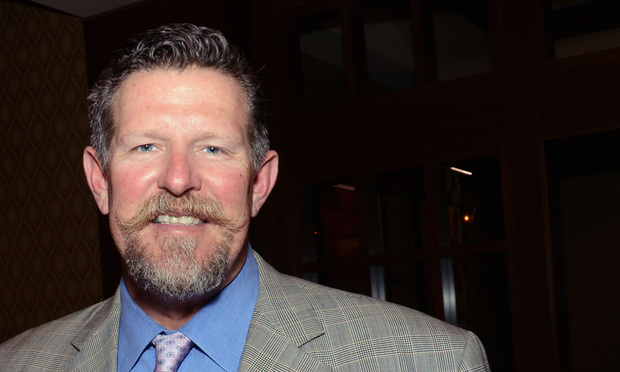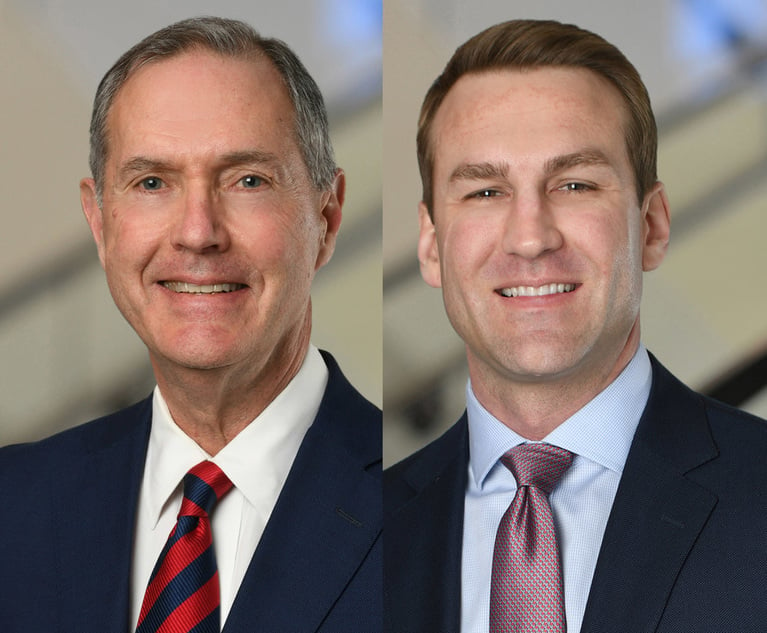Emory Investigating Reports That 2 More Law Profs Used Racial Slur in Class
Both incidents allegedly occurred in classes this week with adjunct professors.
September 13, 2019 at 07:15 PM
7 minute read
 Robert Saunooke. Photo: Melanie Bell
Robert Saunooke. Photo: Melanie Bell
Emory University is investigating reports of two new incidents in which adjunct law professors reportedly used a racial slur in class, a spokeswoman for the university said Friday.
"During one of the instances, after a student raised concern about the necessity of using the word, the professor apologized, and the class continued,"' Laura Diamond, assistant vice president of communications and public affairs, said Friday. "The university is looking into both incidents. Emory remains committed to upholding the principles of equity, inclusion, and respect that all members of community embrace and value."
Diamond said both incidents reportedly occurred Sept. 9.
Although Emory did not identify either adjunct professor, Florida attorney Robert Saunooke confirmed Friday he used a variation of the n-word in class earlier this week.
There was no indication of which adjunct professor was involved in the second reported Sept. 9 incident.
Saunooke said he used the phrase in a Sept. 9 Indian law class while highlighting mistreatment and demeaning labeling that Native American tribes still face, including variations of the epithet preceded by the word "sand" or "red."
"In doing so, I highlighted the 'n-word' as being applied to Native Americans," said Saunooke, a member of the Eastern Band of Cherokee Indians.
Saunooke said a student raised her hand and told him she was offended by his use of the epithet.
"I apologized immediately," he said. But, he added, "It was my story. … I can't change my story. It's who I am. I am not going to filter my life."
Saunooke's description of how he employed the slur differs from an account provided in an open letter on the incident issued by the Black Law Students Association and the Student Bar Association.
In that letter addressed to the Emory University law community, the presidents of the two groups criticized a professor's use of "the n-word." The letter, authored by BLSA president Enu Mkparu and co-signed by SBA president Amneh Minkara, didn't reference the other incident Diamond said is also under investigation, and also didn't specifically name Saunooke.
In the letter, Mkparu said she was informed that a student had objected to Saunooke's his use of the epithet and suggested he "could have used the abbreviation instead."
The letter said that "as relayed by several people in the class," during a discussion about "assimilation, self-determination and racism generally," Saunooke "gave an example in which an acquaintance of his made a comment about how 'Natives and N-words had to assimilate,' to which the professor remarked that he found the comment very upsetting."
Read the letter:
Neither law student responded to an email request for comment.
The alleged Sept. 9 incidents follow one that surfaced last year, which resulted in the indefinite suspension of law professor Paul Zwier, who was also barred from campus for twice uttering the epithet.
Zwier has acknowledged using the racial slur while discussing a race discrimination case in a torts class for first-year law students in August 2018, and later apologized to his class and members of the BLSA and SBA.
Two months later, Zwier told a black student during a private conversation that he had been called an "n-r lover" when he was young because he had black friends. That student subsequently complained to law school administrators that Zwier used the racial epithet a second time.
Emory's Faculty Hearing Committee is scheduled to hold a closed-door hearing on the matter Oct. 4 to consider Zwier's request for reinstatement and a separate request to revoke his tenure. James Hughes Jr., the former acting law school dean who suspended Zwier before stepping down in July, has asked the committee to strip Zwier of his tenure and fire him.
The Emory student-group presidents said in their letter that they told Saunooke and Katherine Hinson, the law school registrar and assistant dean of enrollment services, that the past year's incidents have been "emotionally fatiguing."
"I stated that while I could understand the context of the conversation, the use of the word was unnecessary and disruptive to the learning experience," according to the letter first reported by Above the Law.
Mkparu wrote in the letter that Saunooke apologized profusely for the use of the slur. "He admitted that in hindsight, it was a poor example and he felt 'horrible that he said it,'" Mkparu wrote.
Mkparu said she suggested Saunooke apologize to his class again and meet with the BLSA to apologize. She also said Saunooke offered to meet with the BLSA at their Sept. 25 meeting.
Mkparu added that Bobinski promised to meet with the university vice provost for diversity and inclusion "to discuss the best course of action to repair and prevent such an incident from occurring in the future."
Saunooke said he immediately went to the registrar's office after getting out of the class after using the slur to inform law school administrators about what had happened. The BLSA and SBA presidents arrived while he was there.
"We sat down and had a very good conversation," Saunooke said. "I was very emotional. … I have been deeply involved in diversity and inclusion my entire legal career."
Saunooke is president of the National Native American Bar Association, chairman of the American Bar Association's minority judicial clerkship program, a member of the ABA diversity and inclusion committee, and the only male board member of the Broward County Women Lawyers Association in Florida.
Saunooke also represented former major league baseball player Jose Canseco, who hit 462 home runs during his career, for more than five years over the ball player's use of steroids during his career.
Saunooke said that since he used the epithets in class, "I have been working with the BLSA, and continue to work with them, and to continue the civil discourse on the conversation about this."
Saunooke said he was surprised by the letter BLSA and SBA wrote.
"They felt it necessary to broadcast it to the world," he said. "If you want to resolve something, the more people you involve out of context makes it more difficult."
But, he added, "Given the Zwier situation and the sensitivity, I can understand why."
"I don't judge them. I am not offended. I don't take it personally," he added. "It's not the first time I have had to deal with racial epithets and the mischaracterization of Native American communities."
"The problem we have today is that no one owns a word," Saunooke continued. "And words have no meaning unless you put it in context. I was putting it in a descriptive term about my people's treatment. It was taken the wrong way. I apologized."
Saunooke confirmed he agreed to meet with the BLSA board and "to do whatever is necessary to keep a dialogue open. Civil discourse needs to continue."
"Former U.S. Supreme Court Justice Sandra Day O'Connor said that the biggest problem facing America is a lack of civil discourse," he added. "We've got to be able to disagree, and talk, and still find common ground."
Read more:
'Moral Delinquency and Incompetence:' Interim Emory Law Dean Wanted Prof Fired Over Racial Slur
Legal Community Split Over Emory Professor's Use of Racial Slur
ABA Asked to Censure Emory for Suspending Law Prof Over Racial Slur
Emory Law Professor in Hot Water for Allegedly Using Racial Slur, Again
This content has been archived. It is available through our partners, LexisNexis® and Bloomberg Law.
To view this content, please continue to their sites.
Not a Lexis Subscriber?
Subscribe Now
Not a Bloomberg Law Subscriber?
Subscribe Now
NOT FOR REPRINT
© 2025 ALM Global, LLC, All Rights Reserved. Request academic re-use from www.copyright.com. All other uses, submit a request to [email protected]. For more information visit Asset & Logo Licensing.
You Might Like
View All
Law Firms Expand Scope of Immigration Expertise Amid Blitz of Trump Orders
6 minute read
Bass Berry & Sims Relocates to Nashville Office Designed to Encourage Collaboration, Inclusion
4 minute read
Gunderson Dettmer Opens Atlanta Office With 3 Partners From Morris Manning
3 minute read
Trending Stories
- 1Inherent Diminished Value Damages Unavailable to 3rd-Party Claimants, Court Says
- 2Pa. Defense Firm Sued by Client Over Ex-Eagles Player's $43.5M Med Mal Win
- 3Losses Mount at Morris Manning, but Departing Ex-Chair Stays Bullish About His Old Firm's Future
- 4Zoom Faces Intellectual Property Suit Over AI-Based Augmented Video Conferencing
- 5Judge Grants TRO Blocking Federal Funding Freeze
Who Got The Work
J. Brugh Lower of Gibbons has entered an appearance for industrial equipment supplier Devco Corporation in a pending trademark infringement lawsuit. The suit, accusing the defendant of selling knock-off Graco products, was filed Dec. 18 in New Jersey District Court by Rivkin Radler on behalf of Graco Inc. and Graco Minnesota. The case, assigned to U.S. District Judge Zahid N. Quraishi, is 3:24-cv-11294, Graco Inc. et al v. Devco Corporation.
Who Got The Work
Rebecca Maller-Stein and Kent A. Yalowitz of Arnold & Porter Kaye Scholer have entered their appearances for Hanaco Venture Capital and its executives, Lior Prosor and David Frankel, in a pending securities lawsuit. The action, filed on Dec. 24 in New York Southern District Court by Zell, Aron & Co. on behalf of Goldeneye Advisors, accuses the defendants of negligently and fraudulently managing the plaintiff's $1 million investment. The case, assigned to U.S. District Judge Vernon S. Broderick, is 1:24-cv-09918, Goldeneye Advisors, LLC v. Hanaco Venture Capital, Ltd. et al.
Who Got The Work
Attorneys from A&O Shearman has stepped in as defense counsel for Toronto-Dominion Bank and other defendants in a pending securities class action. The suit, filed Dec. 11 in New York Southern District Court by Bleichmar Fonti & Auld, accuses the defendants of concealing the bank's 'pervasive' deficiencies in regards to its compliance with the Bank Secrecy Act and the quality of its anti-money laundering controls. The case, assigned to U.S. District Judge Arun Subramanian, is 1:24-cv-09445, Gonzalez v. The Toronto-Dominion Bank et al.
Who Got The Work
Crown Castle International, a Pennsylvania company providing shared communications infrastructure, has turned to Luke D. Wolf of Gordon Rees Scully Mansukhani to fend off a pending breach-of-contract lawsuit. The court action, filed Nov. 25 in Michigan Eastern District Court by Hooper Hathaway PC on behalf of The Town Residences LLC, accuses Crown Castle of failing to transfer approximately $30,000 in utility payments from T-Mobile in breach of a roof-top lease and assignment agreement. The case, assigned to U.S. District Judge Susan K. Declercq, is 2:24-cv-13131, The Town Residences LLC v. T-Mobile US, Inc. et al.
Who Got The Work
Wilfred P. Coronato and Daniel M. Schwartz of McCarter & English have stepped in as defense counsel to Electrolux Home Products Inc. in a pending product liability lawsuit. The court action, filed Nov. 26 in New York Eastern District Court by Poulos Lopiccolo PC and Nagel Rice LLP on behalf of David Stern, alleges that the defendant's refrigerators’ drawers and shelving repeatedly break and fall apart within months after purchase. The case, assigned to U.S. District Judge Joan M. Azrack, is 2:24-cv-08204, Stern v. Electrolux Home Products, Inc.
Featured Firms
Law Offices of Gary Martin Hays & Associates, P.C.
(470) 294-1674
Law Offices of Mark E. Salomone
(857) 444-6468
Smith & Hassler
(713) 739-1250






